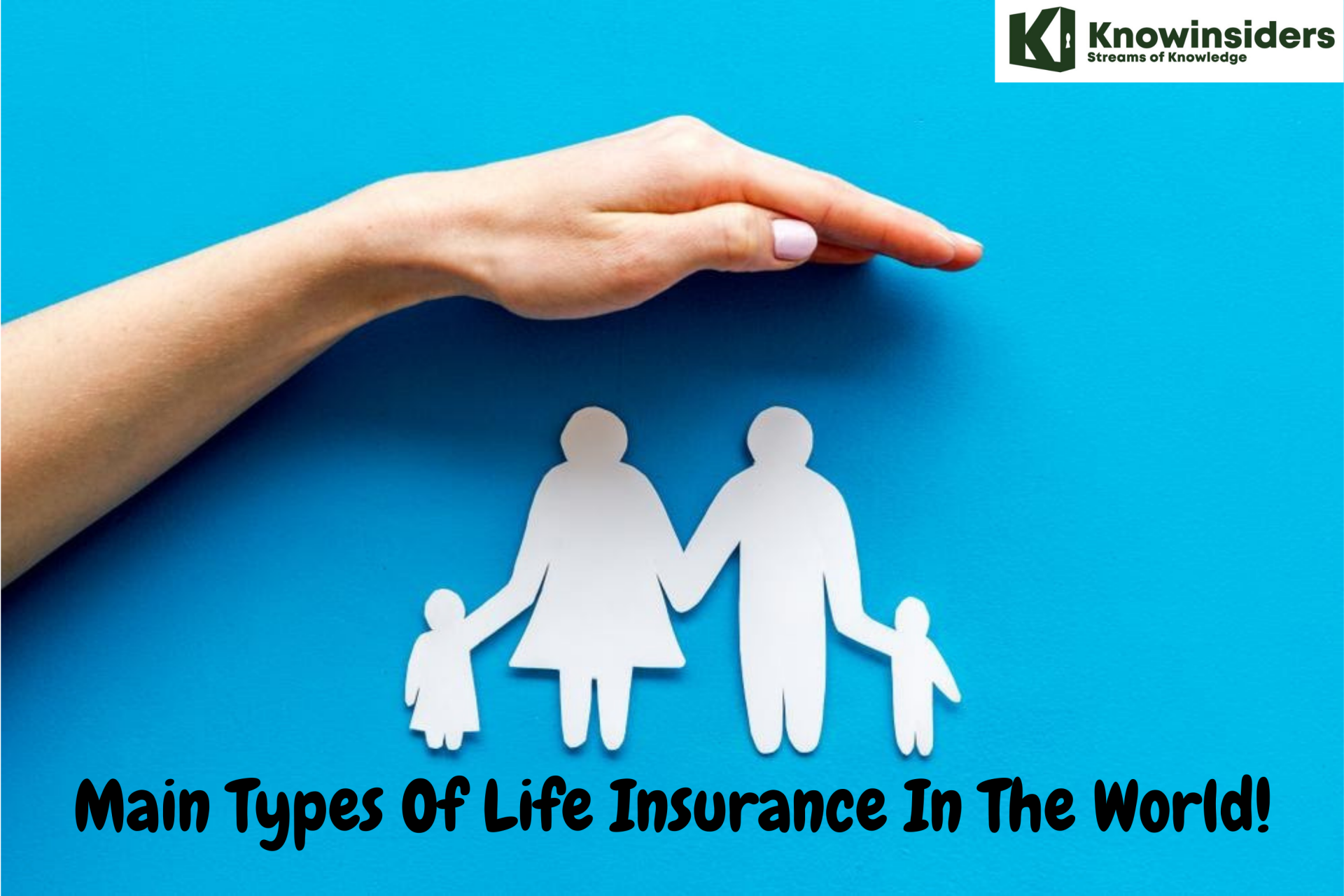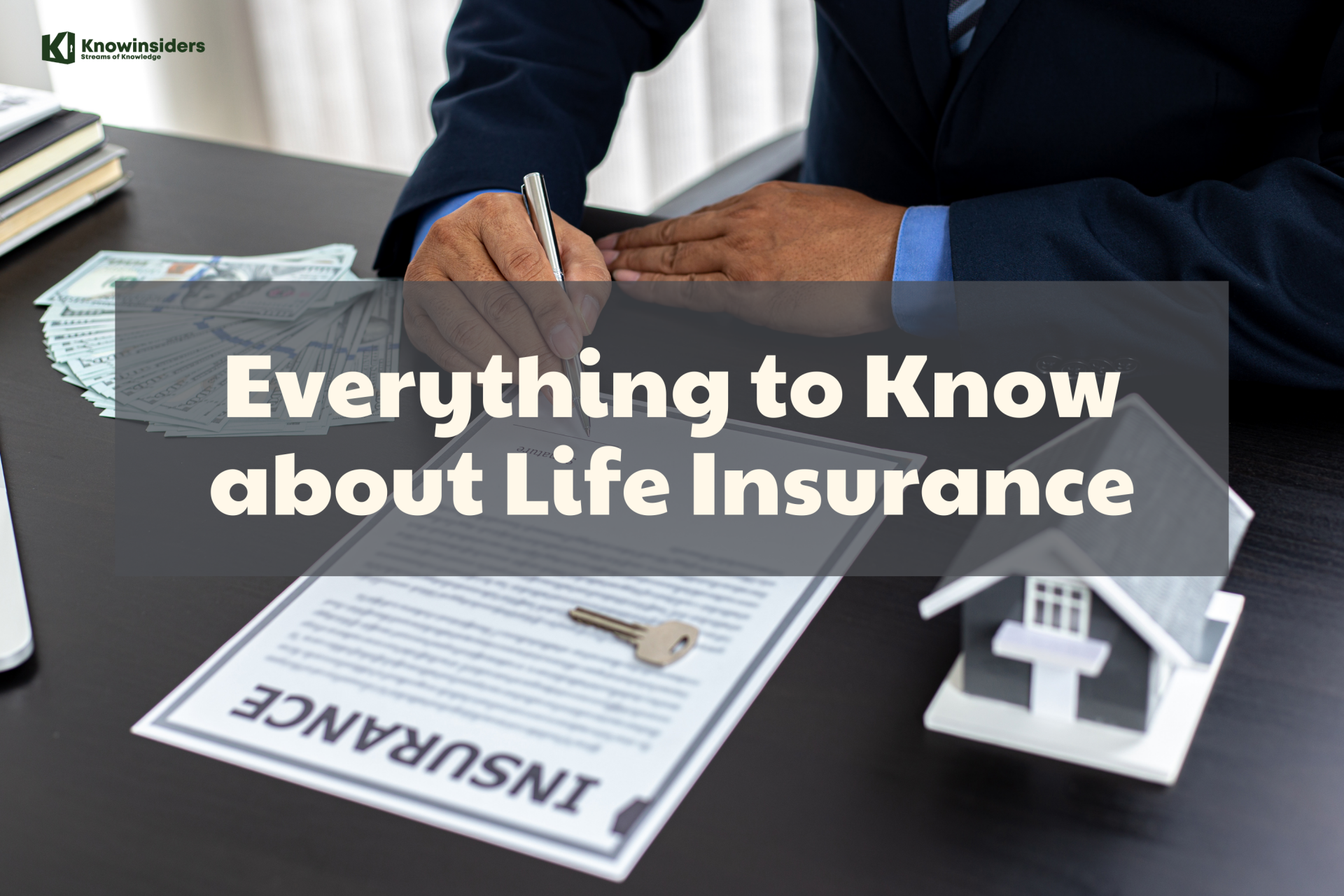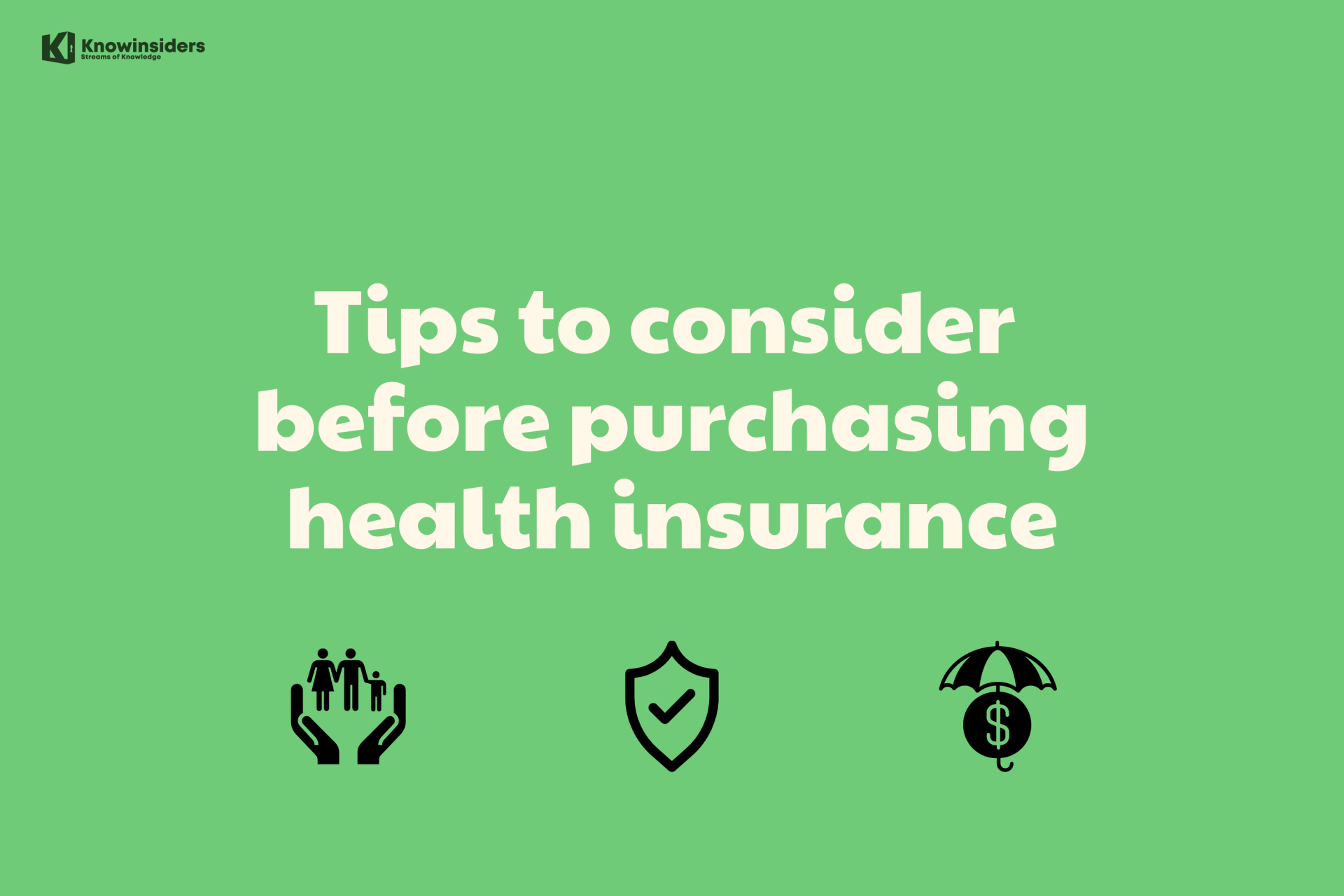Life Insurance: Purposes, Types, Benefits and Cost
 What Type of Life Insurance is Best for You? What Type of Life Insurance is Best for You? |
 10 Best Cheapest Life Insurance Companies In The US Right Now 10 Best Cheapest Life Insurance Companies In The US Right Now |
 |
| What is Life Insurance? Photo: KnowInsiders.com |
| Contents |
Buying life insurance might be a smart financial move. That's because buying life insurance can give your loved ones peace of mind about continuing to be provided for even after you're gone.
In addition to covering the costs associated with your final arrangements, life insurance can be used to help replace lost income or be left to a loved one as an inheritance. Here are some examples of what you can do with a life insurance payout.
What is Life Insurance?
Purchasing life insurance involves entering into an agreement with an insurance provider. The insurance company will give your beneficiaries a lump sum, known as a death benefit, in exchange for the premiums you paid.
Your heirs are free to invest the money in whatever they please. This usually entails things like keeping up with regular bills, making mortgage payments, and funding a child's higher education. If you pass away unexpectedly, having life insurance can help your loved ones maintain their standard of living and continue funding the goals you had set out for them.
Term life insurance and permanent life insurance are the two most common kinds of life coverage. While term life insurance only protects you for a set amount of time, permanent life insurance like whole life or universal life can provide coverage for the rest of your life.
What are the Main Purposes of Life Insurance?
Protection and savings?
Life insurance is primarily bought for financial security, to provide an immediate estate for the living. Insurance plans may offer a savings component, but there are plenty of other opportunities for prudent financial management. Protecting your family adequately should be your top priority when shopping for life insurance; the savings component is secondary.
Even if a family's immediate safety concerns have been addressed, it is still wise to plan for the future by looking into additional savings and investment opportunities. A family's decision to save or invest through life insurance or other media will depend on their individual circumstances, priorities, and financial literacy. It's not an insurance choice, but rather one to save or invest.
Depending on your goals, you might do better with your savings or investments elsewhere. In addition, there are many other ways to save and invest money that don't involve buying life insurance and paying a hefty commission.
Though you don't have to do it all on your own, you can ask experts like those at Everdays about the best option.
Life insurance provides a tax deferral for earnings on the savings or investment portion of the policy, but there are many other savings and investment vehicles that offer the same benefit. The earnings on a life insurance policy that are distributed to beneficiaries after the insured's death are not taxable.
 10 Best Life Insurance Companies In The World 10 Best Life Insurance Companies In The World If you are wondering about the best life insurance companies to protect your family, here is the list of the top 10 best life insurance ... |
How Life Insurance Works
 |
| Photo: Smart Business Daily |
A life insurance policy has two main components—a death benefit and a premium. Term life insurance has these two components, but permanent or whole life insurance policies also have a cash value component.
1. Death Benefit - When an insured person passes away, the insurance company promises to pay the death benefit or face value to whoever is named as a beneficiary in the policy. It's possible that the insured is a parent, and that the beneficiaries are their children. The insured will decide how much of a death benefit they want based on their family's projected financial needs in the future. The insurance company's underwriting requirements regarding age, health, and hazardous activities in which the proposed insured engages will determine whether or not there is an insurable interest and whether or not the proposed insured is eligible for coverage.
2. Premium - Policyholders pay insurance companies a set amount each month called a premium. If the policyholder has paid all of the required premiums, the insurer will pay the death benefit upon the insured's death, and the amount of the premiums is based in part on the likelihood that the insurer will have to pay the death benefit. Age, gender, health, workplace risks, and risky hobbies are just some of the variables that can affect a policyholder's expected lifespan. The premium is not just for covering medical costs, but also for covering the overhead costs of the insurance company. Larger death benefits, higher risk individuals, and permanent policies with cash value accumulation all result in higher premiums.
3. Cash Value - Permanent life insurance has a cash value that serves a dual purpose. Cash accumulates tax-free in an account the policyholder can access at any time during the insured's lifetime. Depending on the policy and the intended use of the funds, withdrawals may be subject to certain conditions. A policyholder may borrow money against the cash value of their insurance policy and be responsible for interest payments on the loan principal. The cash value can be used by the policyholder in a number of ways, including paying premiums and buying supplemental insurance. When an insured person passes away, the insurance company keeps the cash value as a living benefit. If you have taken out loans against the cash value, they will be paid back out of the death benefit.
Types of Life Insurance
Many different types of life insurance are available to meet all sorts of needs and preferences. Depending on the short- or long-term needs of the person to be insured, the major choice of whether to select temporary or permanent life insurance is important to consider.
Term life insurance
Term life insurance lasts a certain number of years, then ends. You choose the term when you take out the policy. Common terms are 10, 20, or 30 years. The best term life insurance policies balance affordability with long-term financial strength.
• Decreasing Term Life Insurance—the decreasing term is renewable term life insurance with coverage decreasing over the life of the policy at a predetermined rate.
• Convertible Term Life Insurance—convertible term life insurance allows policyholders to convert a term policy to permanent insurance.
• Renewable Term Life Insurance—is a yearly renewable term life policy that provides a quote for the year the policy is purchased. Premiums increase annually and is usually the least expensive term insurance in the beginning.
Benefits of term life insurance
There are several types of life insurance, but the most popular type that makes sense for most people is term life insurance. Term life insurance is meant to last until your debts are paid off (generally a 20- to 30-year period while people depend on you most). The benefits of a term life plan include:
• Term life insurance is the cheapest life insurance you can buy.
• If you buy term life insurance when you’re young, you can lock in low rates.
• Term life insurance is purely an insurance product and doesn’t have a savings or investment component. This is a good thing — you can increase your returns by investing and saving on your own.
• If you have a term life policy and can no longer afford it, you won’t lose anything more than the premiums you’ve paid if you decide to abandon the policy.
Permanent life insurance
Permanent life insurance stays in force for the insured’s entire life unless the policyholder stops paying the premiums or surrenders the policy. It’s typically more expensive than term.
• Whole Life—whole life insurance is a type of permanent life insurance that accumulates cash value. Cash-value life insurance allows the policyholder to use the cash value for many purposes, such as a source of loans or cash or to pay policy premiums.
• Universal Life—a type of permanent life insurance with a cash value component that earns interest, universal life features flexible premiums. Unlike term and whole life, the premiums can be adjusted over time and can be designed with a level death benefit or an increasing death benefit.
• Indexed Universal—this is a type of universal life insurance that lets the policyholder earn a fixed or equity-indexed rate of return on the cash value component.
• Variable Universal—with variable universal life insurance, the policyholder is allowed to invest the policy’s cash value in an available separate account. It also has flexible premiums and can be designed with a level death benefit or an increasing death benefit.
Benefits of whole life insurance
 |
| Photo: JC Bass Insurance |
Whole life insurance, on the other hand, combines savings with insurance protection and is a permanent insurance product. Coverage is permanent once purchased as long as the policyholder maintains payment of premiums or accumulates cash value to cover them. In 2021, whole life insurance was quoted at 5–15 times the price of term insurance on Policygenius. Despite the higher premium, whole life insurance offered some distinct advantages.
• Incorporates a savings element into your life insurance policy.
• You can use the cash value part of it as part of a more elaborate estate planning strategy.
• It's an effective method of compelled savings.
• Borrowing against the cash value component is common, but doing so can reduce the final payout.
Financial Benefits of having Life Insurance
It's possible that the more insurance you have, the better off you'll be. Make sure you have enough money set aside for your funeral and any final medical bills when you purchase a life insurance policy, but also look into getting some coverage for the future. Policygenius's advanced planning team senior operations manager Nicholas Mancuso suggests people purchase life insurance equal to 10-15 times their annual income.
Your beneficiaries can use the life insurance to pay for any expenses, including:
• Housing costs, including paying off a mortgage or paying rent
• Other debts, like student loans, credit cards or car payments
• Existing or future college education costs for your children
• Childcare
• Income replacement; this can be especially helpful if your loved ones require time off from work to grieve or if you are the breadwinner
• Everyday costs – including food, transportation and healthcare
Because a life insurance benefit is a tax-free lump sum of money, your family can use the cash however they wish.
Considerations when buying
The financial needs of surviving family members may include:
• Expenses in connection with the death (funeral expenses, final medical expenses not covered by health insurance, expenses for estate settlement, and possibly readjustment expenses such as relocation of the family, etc.)
• Day-to-day living expenses of surviving dependents (food, clothing, etc.).
• Payments on debts (a mortgaged home or farm debt, car loan, etc.).
• Special needs (securing a loan, assuring children's educational expenses, gifts to family, friends or organizations).
• Retirement income for the surviving spouse, and perhaps for other dependents.
Principles for buying
• When buying life insurance, a family should develop a plan and select policies that fit their particular financial needs. They should use life insurance to provide for financial needs that are not met in other ways.
• This plan should fit the family's ability to pay for the insurance because premiums must be paid to keep the insurance in force.
• A family should select the premium period that provides the most economical rate (usually annually). This takes planning and must be included as an item in the monthly budget.
• Families should read each policy carefully. Policy owners should assure themselves they are making the best use of their insurance dollars for the financial security of survivors of the insured person.
• The family insurance program should be reviewed periodically and revised to meet changing needs.
How Much Does Life Insurance Cost?
The cost of life insurance varies significantly depending on several different factors. One of the biggest cost factors will be the type of life insurance you buy. For example, a term life insurance policy is significantly less expensive than a whole life insurance policy for the same amount of coverage.
Here are some of the most common factors affecting life insurance rates:
• Age. The younger you are when you buy a policy the less you’ll pay. That’s because your chance of death is smaller.
• Sex. Females have a life expectancy that is nearly five years longer than males, according to the National Center for Health Statistics. This means that men generally pay more for life insurance than women (except in Montana where insurers must provide gender-neutral life insurance rates).
• Health. Your health has a major impact on your life insurance rates. The insurer will evaluate your past and current medical conditions in order to calculate your life expectancy.
• Lifestyle. Your driving history (such as a DUI conviction), criminal record, and dangerous occupations and hobbies (such as scuba diving) can all result in higher life insurance rates.
Who needs life insurance?Those who want to ensure the financial stability of their loved ones in the event of their death should consider purchasing life insurance. Depending on the size of the policy, the death benefit from a life insurance policy can be used to pay off a mortgage, finance a child's education, or supplement retirement savings. The cash value component of permanent life insurance grows over time as well. |
How do you qualify for life insurance?
Everyone has the option to purchase life insurance, but the premium they pay may vary greatly depending on factors like their age, health, and way of life. Customer applications for life insurance typically necessitate a medical exam and the disclosure of relevant medical records and histories.
Guaranteed acceptance life insurance, which does not require a medical exam, typically has much higher premiums and often requires a waiting period before the death benefit is paid out.
 Best Tips To Purchase Health Insurance Best Tips To Purchase Health Insurance Buying insurance is a significant investment, and you’ll want to invest wisely. Check out this article to know 10 tips to consider before buying health ... |
 Most Weirdest Insurance Policies Around The World Most Weirdest Insurance Policies Around The World What are the weirdest insurance policies in the world? Insurance is available even after the escape of aliens, vampire and bride run away in marriage, ... |
 What Is Mortgage Insurance and How Does It Work? What Is Mortgage Insurance and How Does It Work? What is mortgage insurance, how it works, and what are its benefits? Scroll down to understand more details about the advantages of mortgage insurance. |


























